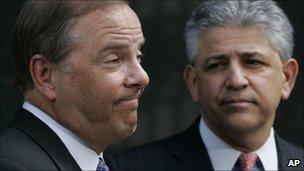Enron's former CEO, Jeffrey Skilling, applies for bail
- Published

Jeffrey Skilling and lawyer, Daniel Petrocelli in 2006
The former chief executive of Enron, Jeffrey Skilling, has applied to be released from prison on bail.
Skilling is serving a 24-year sentence for his role in the collapse of the energy giant in December 2001.
The request follows a Supreme Court ruling that a law used to convict Skilling had been wrongly applied.
That same ruling led to last week's release on bail of the Canadian-born media tycoon, Conrad Black.
Skilling's lawyer Daniel Petrocelli told the BBC World Service's World Business News that he was confident the application would be successful.
"We fully expect Mr Skilling to be released from prison and if the government chooses to retry him, to be fully exonerated," he said.
Enron collapsed in what was then the largest corporate failure in US history.
And in 2006 Skilling was convicted for his part in an accounting fraud, which deceived the authorities and investors over the true state of Enron's finances.
He was found guilty on 19 counts including conspiracy, fraud and insider trading. Enron founder, Kenneth Lay, was also convicted but died six weeks later as he awaited sentence.
'Stretched law'
Both Skilling and media magnate, Conrad Black, were prosecuted using a statute known as the "honest services" law.
In June the US Supreme Court ruled that this law should apply only to cases where bribes and kickbacks had changed hands.
Neither Black nor Skilling were accused of these crimes.
According to Mr Petrocelli the government's case against Skilling relied heavily on the now disputed statute.
"The government stretched honest services beyond breaking point. For that reason we believe the convictions must be set aside," he said.
The US Justice Department has said it will vigorously defend the case against Skilling.
- Published22 July 2010